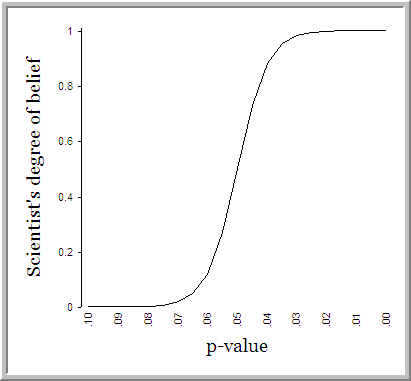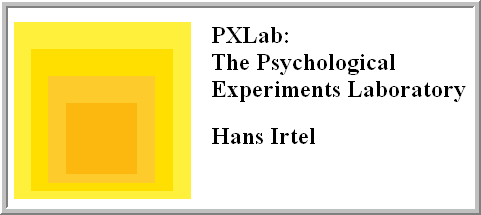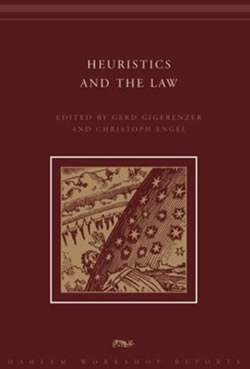SUMMER INSTITUTE IN INFORMED PATIENT CHOICE

Patients make decisions about a matter that is very important to them, their health. New findings on the representation of information can improve decision making, and new tools, such as the Distribution Builder, put these findings to work. It is a bright new era of informed patient choice.This coming summer, try to catch Dartmouth’s summer institute on the topic from June 25th to July 6th, 2007.More information here: http://www.dartmouth.edu/~cecs/siipc/An all-star cast of the decision science crowd includes:Roy Baumeister
Gerd Gigerenzer
Mary Frances Luce
Craig McKenzie
Valerie Reyna
Kathleen Vohs
Timothy D. Wilson
George L. Wolford II
J. Frank Yates
MINDLESS SIGNIFICANCE TESTING
Some well-made points grow old while no one pays attention to them. One of the most embarrassing for social science is its categorical perception of p-values.
Tender of kindred Web site Andrew Gelman and Hal Stern have an article whose name says it all: The Difference Between “Significant” and “Not Significant” is not Itself Statistically Significant.
OTHER RECOMMENDED READING
- Here’s a nice Science News article by Bruce Bower on the issue.
- Cohen, J. (1994). The earth is round (p < .05). American Psychologist, 49, 997-1003.
- Gigerenzer, G. (1993). The superego, the ego, and the id in statistical reasoning. In G. Keren & C. Lewis (Eds.), A handbook for data analysis in the behavioral sciences: Methodological issues (pp. 311-339). Hillsdale, NJ: Lawrence Erlbaum Associates.
- Gigerenzer, G. (2004). Mindless statistics. The Journal of Socio-Economics, 33, 587–606.
- Krantz, D. H. (1999), The null hypothesis testing controversy in psychology, Journal of the American Statistical Association, 94, 1372-1381.
- Rozeboom, W. W. (1960).The fallacy of the null hypothesis significance test. Psychological Bulletin, 57, 416-428.
Image credit: I made it in R
PXLAB: FREE PSYCHOLOGICAL EXPERIMENT SOFTWARE
You could spend a lot of money on software that runs psychology experiments and takes care of: precise timing, control over blocks & randomization, graphics presentation, online data collection, and more.
Or, you could use PXLab which is free and open-source, which means your are allowed to adapt it to suit your purposes and run as many copies as you want.
Visit the site and check out the demos. (The Implicit Associations Test is particularly interesting to try out on yourself if you have never done so before). It’s all a gift of Hans Irtel at U. Mannheim in Germany.
Filed in
Jobs ,
SJDM
 Subscribe
Subscribe to Decision Science News by Email (one email per week, easy unsubscribe)
TENURE-TRACK POSITIONS AT THE SCHOOL OF PUBLIC HEALTH, UNC-CHAPEL HILL
POSITIONS: The Department of Health Behavior and Health Education in the School of Public Health at the University of North Carolina at Chapel Hill is seeking applications for up to three Tenure-Track positions beginning winter/summer 2007. Appointment may be made at the Assistant, Associate or Full Professor level depending upon experience and research and scholarly accomplishments.
DEPARTMENT OVERVIEW: In approaching prevention and disease management in diverse populations and through diverse community settings in the US and internationally, faculty of the Department have identified three areas of particular emphasis: (1) Health Communication, (2) Interpersonal and Social Processes in Health and Disease, and (3) Community Engagement. A range of quantitative and qualitative research methods cut across these, including controlled evaluations of interventions, community-based participatory approaches, and multi-level analysis and modeling. Training programs lead to M.P.H. and Ph.D. degrees and prepare students for careers in public health research, teaching, administration, and practice. Across all of these, the Department is committed to research and practice that advances social justice and especially seeks candidates who will add to the diversity of its faculty.
RESPONSIBILITIES: The Department seeks faculty members who will contribute to its overall research, teaching and service programs. Given its emphasis areas of Health Communication, Interpersonal and Social Processes, and Community Engagement, a cover letter accompanying applications should describe the pertinence of the applicant’s work to one or several of these three areas and, possibly, synergies among them. Along with those whose research addresses thematic or topical aspects of these areas, individuals whose research emphasizes methodological contributions to them are also encouraged to apply. Specific responsibilities will include funded research, teaching graduate level courses, advising graduate students, and participating in the Department’s service programs.
QUALIFICATIONS: An earned doctorate in behavioral or social sciences or other disciplines pertinent to health behavior and health education. Candidates should demonstrate the ability to establish and collaborate in multidisciplinary, funded research programs, as well as a clear track record of scholarly accomplishment. They should also have expertise in working with graduate students as well as a commitment to graduate-level teaching.
DATES: Applications will be reviewed until the position is filled.
TO APPLY, send curriculum vita and cover letter summarizing qualifications to: Edwin Fisher, Ph.D., Chair Department of Health Behavior and Health Education School of Public Health, University of North Carolina at Chapel Hill Rosenau Hall, CB#7440 Chapel Hill, NC 27599-7440 E-mail: searchhlthbeh@email.unc.edu
SJDM 27TH ANNUAL CONFERENCE NOV 17-20, 2006 HOUSTON
It’s on. The 27th (can you believe it?), JDM conference program starts Saturday morning. As usual, Decision Science News will be in attendance, covering both the judgment and the decision-making action.
CONFERENCE TOOLS
Ecologically-rational types will be interested to attend the Brunswik Society meeting Thursday and Friday.
NEURAL REPRESENTATIONS OF EXPECTED UTILITY
Those in the NY metro area may wish to catch a Center for the Decision Sciences talk Thursday, November 9th, 2006 from 5:15pm-6:45pm, at Columbia University’s Warren Hall Room 311 at 115th & Amsterdam in New York City. The speaker is friend of DSN and CDS Jason Zweig and he’ll be discussing insights from his book “Your Money and Your Brain” to be released by Simon & Schuster in April, 2007.
Those who may be interested in Zweig’s book or neuroeconomics generally will find this paper by Brian Knutson and Richard Peterson of the Stanford Psychology Department of interest.
Abstract:
“While the concept of “expected utility” informs many theories of decision making, little is known about whether and how the human brain might compute this quantity. This article reviews a series of functional magnetic resonance imaging (FMRI) experiments designed to localize brain regions that respond in anticipation of increasing amounts of monetary incentives. These studies collectively suggest that anticipation of increasing monetary gains activates a subcortical region of the ventral striatum in a magnitude-proportional manner. This ventral striatal activation is not evident during anticipation of losses. Actual gain outcomes instead activate a region of the mesial prefrontal cortex. During anticipation of gain, ventral striatal activation is accompanied by feelings characterized by increasing arousal and positive valence. These findings affirm the role of emotion in the anticipation of incentives, and may provide an initial step towards a neural reconstruction of expected utility.”
Photo credit: http://www.flickr.com/photo_zoom.gne?id=289982577&size=m
IMPROVING DECISION MAKING BY NOT MEETING FACE-TO-FACE
Scott Armstrong of Wharton has recently polled the mailing lists of decision experts looking for evidence that face-to-face meetings lead to more accurate forecasts and better decisions than alternatives such as virtual teams or prediction markets. He found none. Evidence-based Armstrong comes down on the side of the prediction that face to face meetings are less effective than more efficient alternatives.
To learn more, read the readable article in Foresight: The International Journal of Applied Forecasting.
Photo credit: Gary King’s MatchIt Software: http://gking.harvard.edu/matchit/
Filed in
Conferences
 Subscribe
Subscribe to Decision Science News by Email (one email per week, easy unsubscribe)
PRECONFERENCE ON JDM @ SPSP 2007

The Society for Personality and Social Psychology annual conference will host its second-ever judgment and decision making preconference Thursday, January 25, 2007 in Memphis, the home of Elvis Presley. While we are dropping names we should mention that the speakers are:
- Elke Weber
- Nira Liberman
- Max Bazerman
- Linda Babcock
- Dick Thaler
- Eldar Shafir
- Dan Ariely
- Ap Dijksterhuis
and that the conference is organized by Ayelet Fishbach, Justin Kruger, Peter McGraw, and Neal Roese. For more information, see the official announcement.
Deadline to submit posters is November 15th, 2006.
Photo credit: http://www.flickr.com/photos/litmuse/75068307/
STIGLER’S LAW OF EPONYMY
Statistician and Historian of Science Stephen Stigler told Decision Science News about a useful law. Stigler’s Law of Eponymy: No scientific discovery is named after its original discoverer.
This useful principle helps one think twice before attributing a “named” statistical construct to the person for which it is named. Gaussian distributions, for instance, might better be called de Moivrian distributions, for Abraham de Moivre.
Does Stigler’s law apply to Stigler’s law? Of course, Stigler is clever. He apparently attributes the law to Robert K. Merton.
Filed in
Books
 Subscribe
Subscribe to Decision Science News by Email (one email per week, easy unsubscribe)
HEURISTICS AND THE LAW
Decision Science News is proud to be a part of the recently release by MIT Press Heuristics and the Law, edited by Gerd Gigerenzer and Christoph Engel.
QUOTE FROM CASS SUNSTEIN, UNIVERSITY OF CHICAGO
“An excellent collection, and an important contribution to exciting new work at the intersection of psychology, economics, and law. Highly recommended for everyone interested in knowing how people really behave–and in understanding how actual behavior affects the law”
QUOTE
“In recent decades, the economists’ concept of ration choice has dominated legal reasoning. And yet, in practical terms, neither lawbreakers nor officers of the law behave as the hyperrational beings postulated by rational choice. Critics of rational choice and believers in “fast and frugal heuristics” propose another approach: using certain formulations or general principles (heuristics) to help navigate in an environment that is not a well ordered setting with an occasional disturbance, as described in the language of rational choice, but instead is fundamentally uncertain or characterized by an unmanageable degree of complexity. This is the intuition behind behavioral law and economics.”
CONTRIBUTING AUTHORS
Ronald J. Allen, Hal R. Arkes, Peter Ayton, Susanne Baer, Martin Beckenkamp, Robert Cooter, Leda Cosmides, Mandeep K. Dhami, Robert C. Ellickson, Richard A. Epstein, Wolfgang Fikentscher, Axel Flessner, Robert H. Frank, Bruno S. Frey, Paul W. Glimcher, Daniel G. Goldstein, Chris Guthrie, Jonathan Haidt, Reid Hastie, Ralph Hertwig, Eric J. Johnson, Jonathan J. Koehler, Russell Korobkin, Stephanie Kurzenhäuser, Douglas A. Kysar, Donald C. Langevoort, Richard Lempert, Stefan Magen, Callia Piperides, Jeffrey J. Rachlinski, Clara Sattler de Sousa e Brito, Joachim Schulz, Victoria A. Shaffer, Indra Spiecker genannt Döhmann, John Tooby, Gerhard Wagner, Elke U. Weber, and Bernd Wittenbrink.
 Subscribe to Decision Science News by Email (one email per week, easy unsubscribe)
Subscribe to Decision Science News by Email (one email per week, easy unsubscribe)











